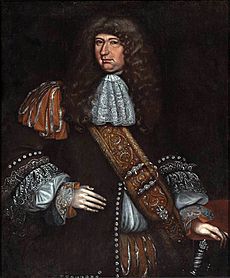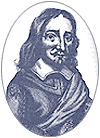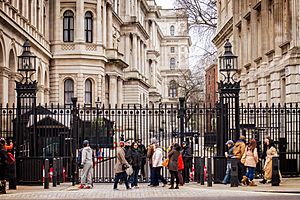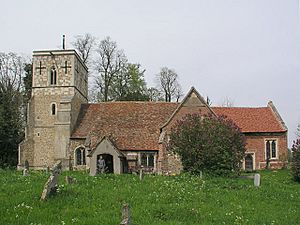Sir George Downing, 1st Baronet facts for kids
Quick facts for kids
George Downing
|
|
|---|---|

Portrait by Thomas Smith, c. 1675–1690
|
|
| Teller of the Exchequer | |
| In office 1660–1684 |
|
| Ambassador to the Dutch Republic | |
| In office 1657–1665 |
|
| Member of Parliament for Morpeth |
|
| In office April 1660 – 1684 |
|
| Member of Parliament for Carlisle |
|
| In office 1656–1660 |
|
| Member of Parliament for Edinburgh |
|
| In office 1654–1656 |
|
| Personal details | |
| Born | c. 1623 Dublin, Ireland |
| Died | pr. 19 July 1684 (aged 59) |
| Spouse |
Frances Howard
(m. 1654; |
| Children | 6, including Sir George Downing, 2nd Baronet |
| Residence | Gamlingay |
| Alma mater | Harvard College |
| Occupation |
|
| Military service | |
| Allegiance | Commonwealth of England |
| Commands | Scoutmaster-General of Commonwealth Forces in Scotland |
| Battles/wars | |
Sir George Downing (born around 1623, died 1684) was an important person in English government. He worked as a diplomat and helped change how the government handled money. He first served under the Commonwealth of England and later under King Charles II.
As a "Teller of the Exchequer," he managed government money. He made big changes to public finances, including helping pass the Navigation Acts. These laws aimed to protect English trade, especially from the Dutch Republic.
Downing played a key role in England taking New York City from the Dutch in 1665. Two streets in New York are named after him. The famous Downing Street in London, where the Prime Minister lives, is also named after him.
Contents
Who Was George Downing?
Early Life and Family
George Downing was born around 1623 in Dublin, Ireland. He was the oldest son of Emmanuel Downing. His mother was Lucy Winthrop, who was the younger sister of John Winthrop. John Winthrop was the Governor of the Massachusetts Bay Colony in America.
His father was a lawyer in London and a Puritan. He did missionary work, first in Ireland and then in New England.
In 1654, George Downing married Frances Howard. She was the sister of Charles Howard, 1st Earl of Carlisle. They had several children together. These included his oldest son, also named George (born around 1656, died 1740).
Education and First Jobs
In 1636, George went to school in Maidstone, England. His family moved to America in 1638 and settled in Salem, Massachusetts. George attended Harvard College. He was one of the first nine students to graduate from Harvard in 1642.
After graduating, Harvard hired him as the college's first tutor. Later in his life, some people made fun of him because of his simple beginnings and his American education.
In 1645, he sailed to the West Indies. He worked as a preacher and teacher for the sailors on the ship. He arrived in England sometime after that. He then became a chaplain in the army regiment of Colonel John Okey.
Working for Oliver Cromwell

Between 1647 and 1651, Downing stopped preaching and joined the military. He fought in important battles like Dunbar in 1650 and Worcester in 1651. During this time, he strongly supported the idea of England being a republic, without a king.
In November 1649, he became the chief scoutmaster for Oliver Cromwell's forces in Scotland. This meant he was in charge of gathering information and managing spies. In 1657, he earned a good salary for this job. From 1656, he also received money as a "Teller of the Exchequer."
Political and Diplomatic Roles
In 1654, Downing was elected as a Member of Parliament for Edinburgh. He was later elected for Carlisle in 1656 and 1659.
His first diplomatic jobs were in France in 1655. He protested the killing of Protestant Vaudois people. In 1656, he was sent to the Duke of Savoy. In December 1657, he became the English Ambassador to the Dutch Republic in The Hague.
Even though Downing was against kings in his younger years, he was one of the first to suggest that Cromwell should become king.
Gathering Information and Dutch Relations
As scoutmaster-general, Downing was very good at gathering information and running a spy network. As an ambassador, he saw collecting information about Dutch plans and royalist plots as a key part of his job. He later used these skills against those who had supported the republic.
Cromwell wanted to unite the Protestant countries in Europe. He also wanted to help make peace between Portugal and the Dutch, and between Sweden and Denmark. But he also wanted to protect England's trade interests from the Dutch.
Downing learned a lot about how the Dutch government managed its money. He used this knowledge to help reform England's royal finances after King Charles II returned to power.
Working for King Charles II
Downing was a skilled diplomat for Cromwell's government. He kept his job even during the political chaos after Cromwell's son, Richard, lost power in 1659. As it became clear that King Charles II would return, Downing worked to gain the king's favor.
He shared secret information from Cromwell's government. He also said he no longer believed in the ideas he learned in New England. After Charles II returned to England in May 1660, Downing was made a knight. He was also reappointed as ambassador to The Hague. He kept his job as a "Teller of the Exchequer." He also received valuable land near St James's Park to build on. This land is now known as Downing Street.
Spying and Arrests
During this time, Downing helped organize spy networks to find many of his former friends. He arranged for the arrest in Holland of John Barkstead, Miles Corbet, and John Okey. These men had been involved in the execution of King Charles I's father. Even though the Dutch resisted, these men were taken to England and executed.
Samuel Pepys, a famous diarist, wrote that Downing's actions were "odious" but helpful to the king. He called Downing a "perfidious rogue" and said everyone saw him as "a most ungrateful villain."
Ambassador to The Hague Again
Downing returned to The Hague as ambassador in May 1661. There, he had to deal with Johan de Witt, the main leader of the Netherlands. De Witt believed his country could not win a war against England or France. So, he worked for peace in Europe so Dutch trade could grow.
After King Charles II returned, de Witt hoped for an alliance between the Netherlands, England, and France. This alliance would cover trade and defense. However, arguments over trade and England's new Navigation Acts made an agreement difficult.
Downing strongly supported English trade. He was against the Dutch, who were England's main trade rivals. He had learned how Dutch traders avoided the Navigation Act of 1651. This knowledge helped him make the Navigation Act of 1660 even stronger.
Rising Tensions and War
Despite Dutch objections to these laws, they wanted to keep talking. But they were frustrated by England's demands for money and for the Dutch to follow old treaties. The talks continued until early 1662. King Charles's finances improved, and Downing advised him not to make concessions. This led to more English demands.
A treaty between France and the Netherlands in 1662 protected the Netherlands from an English attack. This ended the chance for a peaceful Anglo-Dutch treaty. The treaty signed in September 1662 did not satisfy either government.
Trade tensions grew between 1662 and 1664. England made provocations in North America and West Africa. Negotiations to avoid war continued in 1664, but neither side would give up what they saw as important interests.
Downing has been blamed for the bad relations between England and the Netherlands. However, he mostly followed instructions from King Charles II's advisors. Charles II used Downing to gain advantages from the Dutch, even if it risked war.
Downing often reported to London that the Dutch were divided and would give in to English demands rather than fight. Even after the Royal Navy started seizing Dutch ships, he claimed the Dutch would accept it. He believed some Dutch leaders would work with England against their own government. This led to a failed attempt to overthrow the Dutch government.
France tried to prevent the war, but it failed. The war began on March 4, 1665, when the Dutch declared war. This happened after English attacks on Dutch ships. Downing was later expelled from the Netherlands for organizing spying.
Downing was a Member of Parliament and a diplomat. He was close to where decisions were made in England. He worked for a king who was not rich and did not fully control Parliament. He was against a wealthy Dutch state where Johan de Witt had much control. Downing did not realize that the Dutch had limits to what they would give up. He underestimated their willingness to fight to protect their trade.
Taking New York
A treaty in 1650 was supposed to set the border between the Dutch colony of New Netherland and the English colony of Connecticut. This treaty was accepted by the colonies but not by the English government. England claimed the western part of Long Island and land east of the Hudson River.
During the first war between England and the Dutch, English colonists planned to attack New Netherland. But the war ended before they could start.
For several years, the 1650 border remained. However, the Dutch colony allowed English settlers to sell their goods to Dutch traders, which was against English laws. From 1657 to 1664, Downing was perfect to advise King Charles II. He knew about New England and lived in The Hague.
Charles II and his chief minister decided to claim New Netherland. They used Downing to tell de Witt that Charles was just claiming his rights, not starting a war.
Downing was one of the people who advised the English government in January 1664 to attack New Amsterdam. This was to support Connecticut's claim to land west of the 1650 border. He supported sending a naval force to help local militias capture the town. This led to England taking control of what became New York.
Parliamentary Work
Downing became a Member of Parliament for Morpeth in April 1660. He represented this area until his death. He was skilled at speaking about money and trade issues.
In 1665, after being expelled from the Netherlands, Downing added a special rule to a bill to fund the war. This rule said the money could only be used for the war. This was a new idea and gave Parliament more control over how the king spent money.
In May 1667, Downing became secretary to the treasury commissioners. He helped manage and reform the Treasury.
He was made a commissioner of customs in 1671. The same year, he was sent to Holland again. His job was to break up an alliance and start another war between the Dutch and England. He was very unpopular there. After three months, Downing fled to England because he feared the angry crowds. For leaving without permission, he was sent to the Tower of London in February 1672. He was released a few weeks later.
Death and Legacy
His wife, Frances, died on July 10, 1683. Downing himself died a year later, in 1684. He was buried in the family vault he built in All Saints' Church, Croydon, Cambridgeshire. He left a large fortune. Some critics said he got rich by being very stingy with money.
Despite his skills in politics, diplomacy, and finance, Downing has often been seen in a bad light. This is because he was willing to betray old friends to gain favor with new leaders. However, his contributions to financial reform and diplomacy are now being recognized more.
He published many writings, mostly in Dutch. He also wrote "A True Relation of the Progress of the Parliament's Forces in Scotland" in 1651.
Images for kids
| Parliament of England (to 1707) | ||
|---|---|---|
| Preceded by Thomas Widdrington Ralph Knight |
Member of Parliament for Morpeth with Ralph Knight 1660–1661 Henry Widdrington 1661–1666 Viscount Morpeth 1666–1679 Daniel Collingwood 1679–1684 1660–1684 |
Succeeded by Sir Henry Pickering, Bt Theophilus Oglethorpe |
| Political offices | ||
| Unknown | Teller of the Exchequer 1660?–1684 |
Succeeded by Simon Clifford |
| Baronetage of England | ||
| New creation | Baronet (of East Hatley) 1663–1684 |
Succeeded by George Downing |
 | Bessie Coleman |
 | Spann Watson |
 | Jill E. Brown |
 | Sherman W. White |






